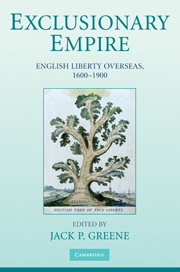Book contents
- Frontmatter
- Contents
- Notes on Contributors
- Preface
- Introduction
- 1 The Languages of Liberty in British North America, 1607–1776
- 2 Liberty and Slavery
- 3 “Era of Liberty”
- 4 Liberty and Modernity
- 5 Federalism, Democracy, and Liberty in the New American Nation
- 6 Liberty, Order, and Pluralism
- 7 Contested Despotism
- 8 “… a bastard offspring of tyranny under the guise of liberty”
- 9 How Much Did Institutions Matter?
- 10 The Expansion of British Liberties
- Index
4 - Liberty and Modernity
The American Revolution and the Making of Parliament's Imperial History
Published online by Cambridge University Press: 05 June 2012
- Frontmatter
- Contents
- Notes on Contributors
- Preface
- Introduction
- 1 The Languages of Liberty in British North America, 1607–1776
- 2 Liberty and Slavery
- 3 “Era of Liberty”
- 4 Liberty and Modernity
- 5 Federalism, Democracy, and Liberty in the New American Nation
- 6 Liberty, Order, and Pluralism
- 7 Contested Despotism
- 8 “… a bastard offspring of tyranny under the guise of liberty”
- 9 How Much Did Institutions Matter?
- 10 The Expansion of British Liberties
- Index
Summary
To Britons during the three centuries covered by this volume, Parliament was the great palladium of British liberty. Although rhetoric did not always match reality, the House of Commons served as the final bastion of representative government in both England and (after 1707) Scotland, the Lords and Commons together guaranteed the personal and property rights of both rich and poor, and Parliament was a mainstay of the English common law. Within Britain's settler empire, by contrast, Parliament's history as a guarantor of liberty was more ambiguous. As Victorian imperialists never tired of noting, libertarian reforms such as Catholic emancipation in Ireland, the suppression of the African slave trade, and, eventually, the abolition of slavery in the West Indies all would have been impossible without forceful intervention from Westminster. Yet these same writers recognized that the theoretically unlimited authority that Parliament claimed over the British empire as a whole was potentially inimical to British liberty as it was practiced in the colonies of settlement. In the words of the nineteenth-century English historian F. W. Maitland, Parliament's imperial sovereignty was boundless in theory but limited in practice: Although free to govern the empire as they saw fit, members of Parliament “habitually” refrained “from making laws of a certain class and [had to] suspect that if [they] made such laws they would not be obeyed.”
- Type
- Chapter
- Information
- Exclusionary EmpireEnglish Liberty Overseas, 1600–1900, pp. 112 - 131Publisher: Cambridge University PressPrint publication year: 2009
- 1
- Cited by



